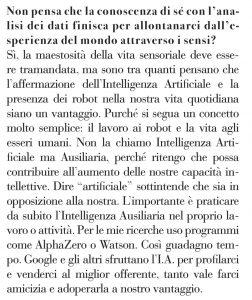For work and my personal culture, I voraciously leaf through the pages of Vogue Italia, with the anxiety of someone who wants to bridge a distance that feels distant but approachable, but I never thought I'd stop and re-read an article for more than the necessary time for a quick and fleeting reading. Because I never thought I'd find an article so culturally transversal that I'd be so interested in writing a post.
We are talking about DNA.
But we don't start from Fashion and the stylistic code of the Brand that delivers the Brand's identity around the bodies, this time the journalist starts from the origin of the term, from its discovery, immediately going to the point of contact. Humanism, transhumanism, evolution of species and everything that would bore you are left out.
The journey starts, direct and pungent, from a concept proposed by a French scientist named Joel de Rosnay which is starting to intrigue me more than the title managed to drag me into the words of the article:
“The majesty of sensory life must be handed down. But if no one knows how to say what life will become anymore, all that remains is for individuals to be aware authors of their own transformation”
Referring to the great discovery of the DNA structure which took place in 1962 as something which, by revealing the secret of life, gave man awareness of the code with which nature creates us.
Not resigned, rather enthusiastic about the discovery, he creates epigenetics. A theory that some factors in people's hands are able to change their genes without altering their genetic code. And trivially, with the usual simplicity with which a scientist translates the complexity of the unknown into something bright and dazzling, the factors he claims are capable of modifying our genes are: meditation, nutrition, human relationships and sport. So far, interesting but as I read, I expect sooner or later to arrive at the fateful moment in which he will tell me how man's DNA is intertwined with that of fashion. I was curious to find out how he and the journalist built it.
But the twist comes unexpectedly.
When the journalist who interviews him reminds him that there are technologies, the internet and artificial intelligence, I witness a question and answer that takes me directly to the pages of my blog to write this post:
Q: Don't you think that self-knowledge together with data analysis ends up distancing us from the experience of life through the senses?
Who would have guessed. On Vogue. I was thinking of an epilogue to the article addressing how DNA lives in fashion and maps the codes of creatives and brands. But like a sudden unannounced thunderbolt, lightning strikes the screen of my iPad and glues me to my seat. “Well, now what will the scientist tell him? That we are destined for a future poor in everything and that not even epigenetics will be able to solve the problem?
A:… I'm among those who think that the emergence of Artificial Intelligence and robots is an advantage. In the meantime, I would not call it Artificial Intelligence but Auxiliary, because I believe it can contribute to the increase of our intellectual abilities. As long as the work to the robots and the life to the man.
Well, what can I say. Dear journalist and Joel, read the preview of my book "Sapient, The birth of Artificial Intelligence"because that's exactly what we're talking about. And thanks for the inspiration you gave me. It confirmed to me what I have been thinking for some time, namely that we are destined for a bright future where intelligences will experience an extraordinary and accelerated evolutionary moment. Too bad I won't be alive and able to participate. Sin. Like you, after all. Here everything is slowed down by the smallness of the interests of individuals on which not even fashion can.

